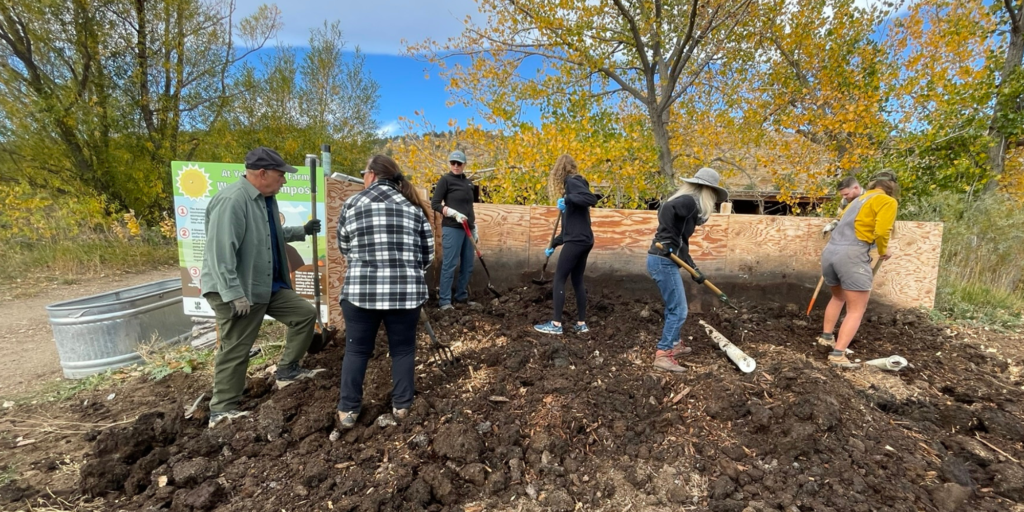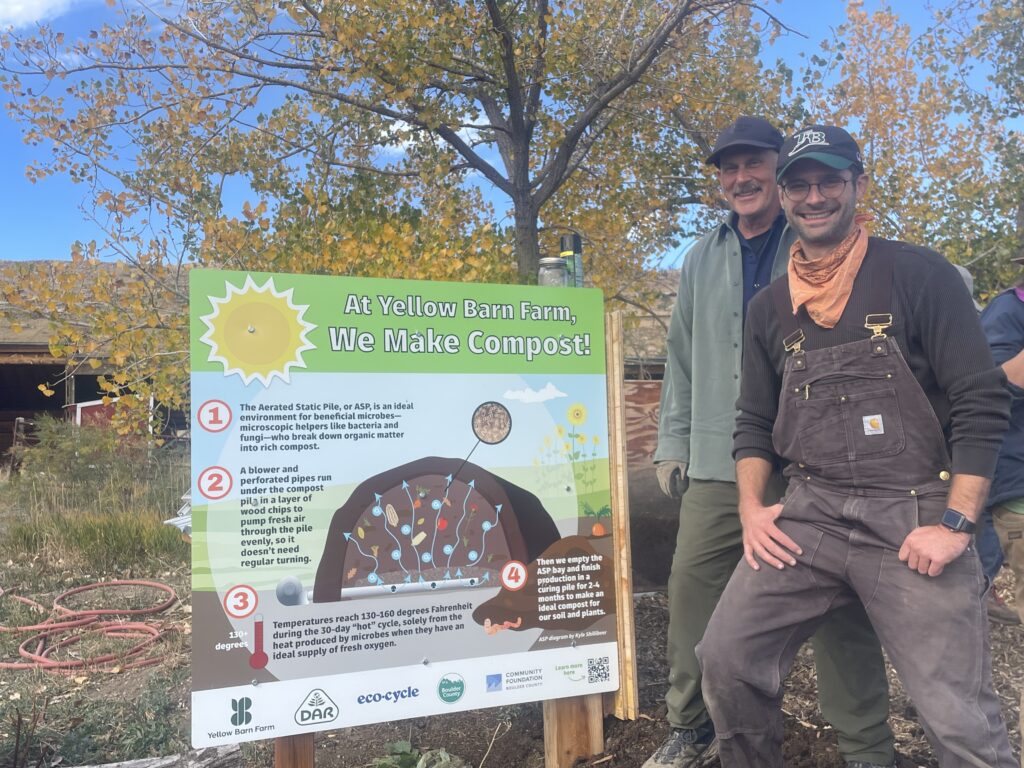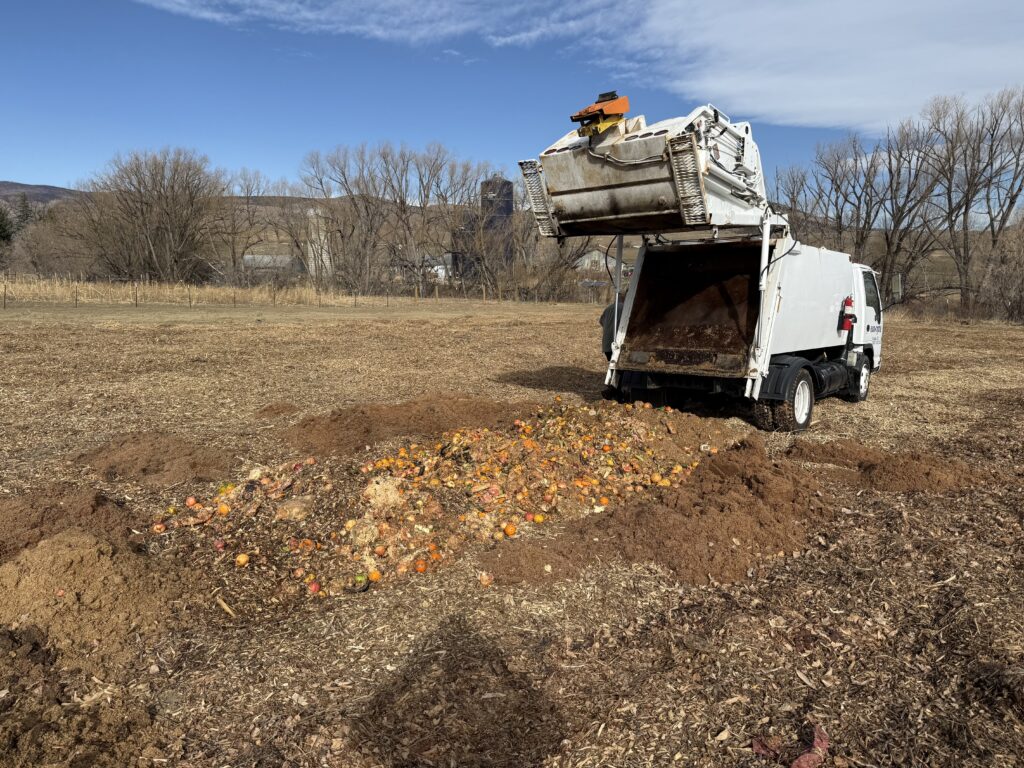Closing the Loop: How Boulder County Farms Are Turning Food Waste into Climate Solutions
What if our food scraps could help grow healthier food while combating climate change? Eco-Cycle’s Farmer First compost model is turning clean food scraps into high-quality compost on Boulder County farms—closing the loop and creating real climate solutions here at home.

Every day in communities across the country, food waste ends up in the worst possible place: the landfill. According to the Environmental Protection Agency, food is the single largest component taking up space inside US landfills, making up about 24% of municipal solid waste. The United States discards more food than any other country in the world: nearly 120 billion pounds every year.
When organic matter like food scraps and yard trimmings decomposes without oxygen in landfills, it produces methane—a greenhouse gas more than 84 times more potent than carbon dioxide in the short term. Instead of nourishing the soil, this valuable material becomes a major contributor to climate change.
Even when food scraps are composted, municipal compost systems often fall short of their full climate and soil-building potential. Industrial composting facilities play a vital role, but their centralized nature can present challenges. For example, they are often located far from the communities they serve, requiring long-haul transportation that increases emissions and costs. These systems also tend to receive loads contaminated with plastic and other non-compostables, which slows down processing, drives up expenses, and can result in a lower-quality compost product that doesn’t meet farmers’ needs.
Expanding more localized and community-based composting options closes these gaps and builds healthier soils closer to home.
That’s where Eco-Cycle’s Farmer First Compost System is different. This closed-loop, super-localized model turns food waste into a local climate solution by collecting the very cleanest food scraps generated in the community and delivering them directly to local small-scale farms in Boulder County, where they are turned into high-quality compost for use on-farm.

Here’s how Farmer First works:
- Collect Clean Food Scraps: Eco-Cycle collects food scraps from local restaurants, schools, and businesses that produce high-quality, contamination-free discards.
- Deliver Directly to Farms: These clean scraps are brought to farms, where they’re turned into high-quality compost on-site. Through partnerships with local farmers, Eco-Cycle has helped install innovative, small-scale Aerated Static Pile (ASP) composting systems—efficient, low-impact setups capable of producing top-tier compost that can be used right where it’s needed. The systems are highly functional, productive, and low-cost—made almost entirely from reused pallets sourced from our friends at Resource Central.
- Apply Compost to the Land: Farmers receive training on how to maintain and utilize the systems. They apply the compost to their fields to restore and enrich the soil, increasing its ability to absorb carbon, retain water, and grow more nutrient-dense crops.
- Harvest and Feed the Community: The food grown from this healthy soil stays local, reaching residents through farmers’ markets, CSAs, and local food providers. It also returns to the businesses, schools, and restaurants that generated the clean food scraps to make the compost.
- Continue the Circular System. Clean scraps from this food come back once again to the farmers to keep the compost cycle turning.
This model isn’t just about waste diversion—it’s about building a regenerative system where food “waste” powers healthy soils and food production.

Why Clean Compost Matters
Regenerative farmers rely on compost (rather than synthetic fertilizers) to build healthy, living soil. But not all compost is created equal. Contaminants like plastics, produce stickers, and other non-organic materials commonly found in industrial compost streams degrade compost quality and limit its use on food-producing fields.
By contrast, Eco-Cycle’s Farmer First model prioritizes “clean organics”—clean food scraps collected from local businesses, restaurants, and schools with strong waste-sorting practices. These clean materials don’t need additional processing to weed out contamination, and they allow farmers to make high-quality compost that meets their specific needs for growing food.
Environmental Benefits That Scale
This local, decentralized network of small-scale production sites on local farms offers major environmental advantages. In Boulder County, most organics generated in the community are currently delivered to a regional compost facility located over 50 miles away. By cutting long-distance transportation out of the composting process, the Farmer First method reduces greenhouse gas emissions and fossil fuel use. Applying compost to the land helps restore topsoil and boosts the ability of soil to sequester carbon from the atmosphere and store it safely and beneficially, reversing climate impacts.
It’s also a drought resilience strategy. Compost-rich soil retains water more effectively, reducing the need for irrigation and making farms more resilient in the face of increasing climate stress.
A Stronger Local Food System
Keeping compost production and application local strengthens Boulder County’s food system. Farmers gain access to affordable, high-quality soil amendments produced on their own land. Food grown in compost-enriched soil is more nutrient-dense and resilient. And because the food stays local—sold through farmers’ markets, CSAs, and wholesale to schools and restaurants—the benefits come full circle, nourishing the same community that helped create the compost in the first place.
Ultimately, Eco-Cycle’s Farmer First compost model demonstrates what a truly circular, community-based food system can look like: one that values resources, builds soil, supports farmers, reduces emissions, and restores the health of both people and the planet.
- Learn more about the benefits of composting and how “carbon farming” builds healthier soils, more nutrient-dense foods, and draws down carbon in the atmosphere.



























